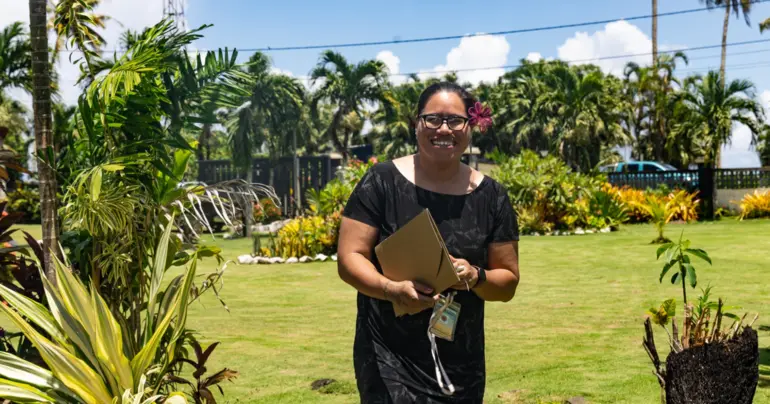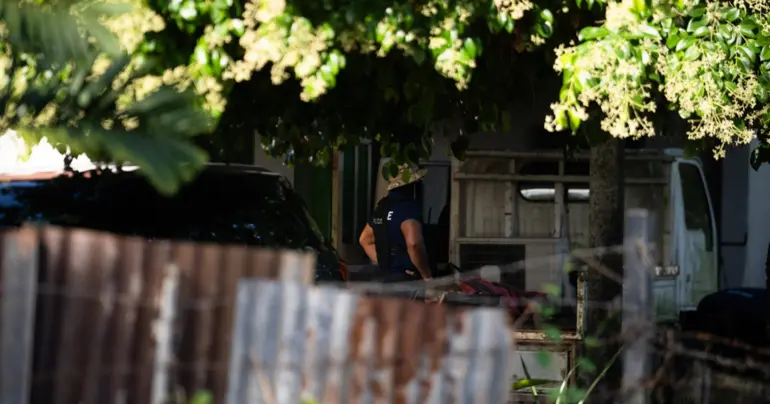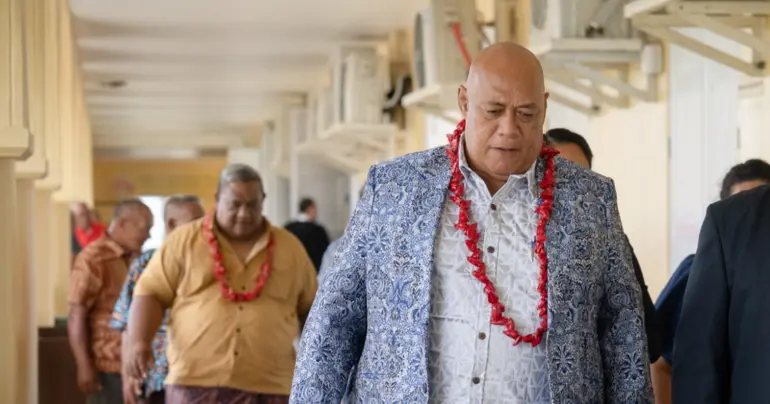Government's vaccine priorities baffling
 By The Editorial Board
•
20 April 2021, 12:50AM
By The Editorial Board
•
20 April 2021, 12:50AM
The caretaker Prime Minister and the Minister of Health being publicly vaccinated on Sunday afternoon was a perfect example of doing the right thing in precisely the wrong way.
Tuilaepa Dr. Sa'ilele Malielegaoi followed the example of leaders around the world in what was designed to be a display of confidence in the safety of the vaccine, one which confronts skeptics head-on.
But if we compare the staged media jab of Tuilaepa and Faimalotoa Kika Stowers with that taken by other world leaders we notice some key differences.
In countries around the world leaders who have rolled up their sleeves in the interests of inspiring confidence in vaccinations have been illuminated by the flash of camera lights and been surrounded by reporters from independent media outlets asking question asking questions.
By contrast, our Government gave the public and the media no prior notice of the fact that its AstraZeneca rollout was now underway.
There was no open invite to journalists to ask the caretaker Prime Minister questions about his experience or to independently document a turning point in Samoa’s COVID-19 saga.
Instead it ran a closed shop event inviting only journalists from its authorised, state-owned newspaper to cover the event and distribute pictures to other independent media after the fact.
The media instead had to make do with officially sanctioned and frankly less than top-notch Government pictures and carefully prepared statements. What should have been a national moment became a heavily stage-managed and sanitised Government back-patting.
"It was just the Prime Minister and the Minister of Health to officially open the rolling out of vaccination which starts tomorrow just like the program that was released to you all," the caretaker Government spokesman told the Samoa Observer on the phone.
This process strikes us as an opportunity lost and the first setback for the ambitious COVID-19 rollout across Samoa.
Leaders make their vaccinations public events for a reason; to discourage anti-vaccine sentiments in a display of confidence in the safety of the vaccine.
And just such a display could not be more timely.
Denmark became the first European country last week to ban the AstraZeneca vaccine, while other countries restricted or suspended theirs as links between the vaccine and cases of blood clotting are investigated.
In Australia, the death of a 48-year-old woman from a rare blood clotting disorder has been linked by authorities to her having received the vaccine. Investigations are ongoing into whether a pre-existing medical condition may have correlated with her death.
In the dark corners of the internet in which they thrive news such as this will be manna from heaven for the anti-vaccine groups across Western countries and which, as we saw in 2019, have a codependent relationship with Samoa’s significant local population of vaccine opponents.
In reality, it’s important to put these risks in perspective.
But the risk of developing fatal clots from the AstraZeneca vaccine has been estimated to be at just over one-in-a-million, according to the United Kingdom’s Medicines and Healthcare Products Regulatory Agency.
What is more, doing nothing is itself a risk and likely a greater one. .
All vaccinations have potential side effects and each is weighed against the risk to public health in general.
In deciding not to suspend its distribution of the AstraZeneca vaccine despite the cases, Australia’s Chief Medical Officer, Paul Kelly, struck a very poignant note:
"People who had [a COVID-19] infection, were nine times more likely to get this [rare clotting condition], compared to the rates we now know from the AstraZeneca vaccine," he said.
But in this fevered climate where misinformation is spreading across social media by anti-vaccination warriors such as a former guest of honour to Samoa, Robert F. Kennedy Jr., it is imperative that the Government uses its authority to inspire public confidence.
The first step to doing so would have been to make Sunday’s vaccination an open media call.
The event being cloaked in a veil of secrecy will only be something onto which conspiracy theorists will pounce upon and apply their twisted logic.
Without holding its event openly, the Government’s vaccination on Sunday was, in many ways, self-defeating.
But Sunday’s closed event also foreshadowed a far more important question that now looms over how the more than 12,000 vaccines Samoa has received will be rolled out.
"We are still preparing as we go in terms of our rollout plans. But the vaccinators and front liners are first to be vaccinated,” the Government’s press secretary said on Sunday.
That simply is not good enough. The Government should make clear what its criteria are for who constitutes a frontline worker and who does not.
Many will say such a definition could not be more intuitive: workers in the hospital systems, those dealing with incoming passengers from international arrival flights, and the dock workers who ensure that the nation’s supply chains have continued throughout the pandemic.
Seemingly, we would agree.
But we learnt on Monday that members of the Government’s public relations staff were among the first three dozen Samoans to receive vaccinations.
This prompts many questions, not least of all why would members of state-owned media be given such preferential treatment to receive vaccinations?
In certain countries - Papua New Guinea, Indonesia, and even America - where community transmission of the disease is rife, cases are high and reporters are genuinely covering an active epidemic, vaccinating them makes sense. For the same reason that protecting a non-Government embedded journalist in a war zone with a flak jacket does.
But let's remember the environment in which these Government communications officials are working. Samoa has had one case of COVID-19 and he has recovered. Does including people paid to push the official Government line in the first batch of 35 to receive vaccinations here? Not by a long shot.
The Government has tried to justify giving its media team preferential access to the vaccinations by suggesting that they cover events such as the arrival of repatriation flights or ship arrivals, putting them at potential risk.
But so does this newspaper and guidelines keeping people well away from potential quarantine zones are strictly enforced.
The interim Chair of National Emergency Operations Centre, Agafili Shem Leo, even said that by having state-owned media employees vaccinated they could take responsibility for COVID-19 coverage on behalf of the broader "media fraternity".
No, thank you. If pushing Government media workers to the front of the vaccination queue is, by accident or design, going to result in only officially authorised accounts about the pandemic being broadcast we will face an information crisis. Anyone familiar with the Government's many state-owned media outlets knows their employees fail the basic journalistic duty of asking difficult questions and of applying scrutiny - values most indispensable in a time of crisis.
The bigger question about why journalists have been chosen to meet the definition of frontline workers must be answered in the context of Samoa's lack of access to vaccines.
Currently, the nation has only doses sufficient for 12,000 people.
If journalists are indeed deemed “frontline workers” and independent professionals are afforded equal opportunity to access the vaccine (which seems unlikely) we at the Samoa Observer would refuse the opportunity on principle.
At least, that is, until the many others at greater risk of contracting COVID-19 than reporters and editors, such as the elderly, physically infirm and those truly on the frontline of Samoa's engagement with the outside world have been protected.
So far the only certainty about Samoa’s vaccine programme is that it is expected to receive from the World Bank managed COVAX facility, sufficient vaccinations for 20 percent of its population.
As for the rest? Well, when or where from that arrives is far from certain. Samoa’s best hope is that once its neighbours in Australia and New Zealand fully vaccinate their own populations they begin exporting them to the Pacific.
But a logistical undertaking of such a scale is perhaps unprecedented in human history. It was always likely to be fraught with errors and predictions that Samoans could be completely vaccinated by year’s end always seemed optimistic.
Proof is already emerging that targets around the world have been over optimistic.
Australia’s Prime Minister, Scott Morrison, is being taken to task by that country’s media after promising to have the entire country vaccinated by October. Supply difficulties have since led him to abandon that promise and refuse to commit to any targets whatsoever.
After the European Union struck a deal with AstraZeneca to supply an enormous 90 million doses of the vaccine by the first quarter of this year. Within months the company complained it was overwhelmed and said it could commit to only 30 million.
Samoa faces yet more uncertainty about its COVID-19 future. And so long as it does the vaccinations we do have are precious commodities which we have a moral obligation to dispense to those most in need of them.
Ensuring that happens obliges the Government to be honest and open about what definitions it is using to determine who receives the vaccines and how many have been dispensed. Until it does so it will only be worsening the public's deficit of confidence that already surrounds the Government and healthcare.
 By The Editorial Board
•
20 April 2021, 12:50AM
By The Editorial Board
•
20 April 2021, 12:50AM










